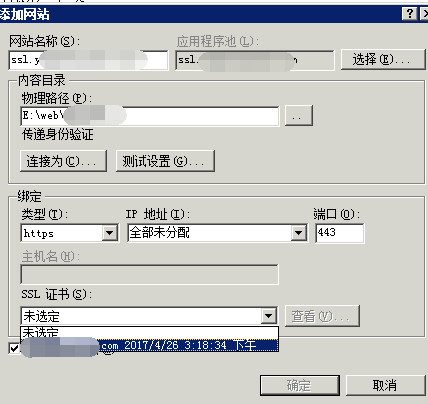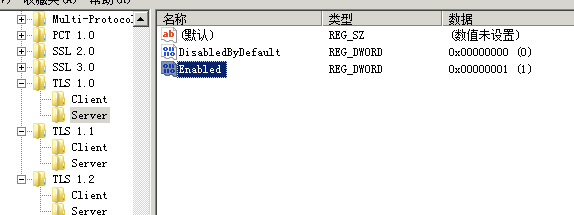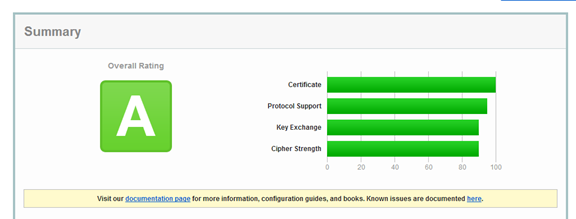1.https证书的分类
SSL证书没有所谓的"品质"和"等级"之分,只有三种不同的类型。
SSL证书需要向国际公认的证书证书认证机构(简称CA,Certificate Authority)申请。
CA机构颁发的证书有3种类型:
域名型SSL证书(DV SSL):信任等级普通,只需验证网站的真实性便可颁发证书保护网站;
企业型SSL证书(OV SSL):信任等级强,须要验证企业的身份,审核严格,安全性更高;
增强型SSL证书(EV SSL):信任等级最高,一般用于银行证券等金融机构,审核严格,安全性最高,同时可以激活绿色网址栏。
我们只要使用DV证书就可以了,一般来说我们申请到的免费ssl证书都是dv证书。
2.申请免费的证书
2.1 自签名惹的祸
Ca证书必须要可信任的机构颁发才可以信任,自签名证书就是自己给自己签名,没有通过第三方CA机构颁发。浏览器默认添加了一些可信任的CA机构,都是通过国际Web Trust认证的。
如果你的CA证书不是这些浏览器里默认添加的可信任的CA机构签发的话,那么就会出现像12306这样的笑话。

2.2申请免费的DV证书
Let's Encrypt是国外一个公共的免费SSL项目,由 Linux 基金会托管,由Mozilla、思科、Akamai、IdenTrust和EFF等组织发起,靠谱!
申请免费的证书可以参考这篇文章,工具和步骤都非常的完整,这里就不累述了
http://www.cnblogs.com/teamblog/p/6219204.html
最后申请完之后iis的配置就是新建一个网站,其他都不用配置,就可以了,老的网站不要删除,如果要强制https访问的话可以再搜索其他的文章,这里不再展开

3.https网站安全验证
https已经可以访问了,但是https就一定是安全的吗,我们可以通过下面这个网站进一步检查你的网站的安全性,主要是从https的安全性去测试
https://www.ssllabs.com/ssltest/analyze.html
可能一开始测试是个F,像我一开始测试就是个F,这是因为操作系统的默认设置里有很多不安全的设置,需要我们手动来配置修改。

可以仔细看下面的说明,没有开启TLS1.2 ,RC4已经过时了,Forward Secrecy支持的不好等等。
4.为了A+不断修改
这里大段的删除线是我一下午的心血,哪怕最后发现了powerShell脚本可以一次性完成上面所有的工作,你可以不看,但请尊重我的劳动
4.1 关闭SLL2和SSL3
找到HKEY_LOCAL_MACHINESYSTEMCurrentControlSetControlSecurityProvidersSCHANNELProtocols右键->新建->项->新建SSL 2.0,SSL 3.0
SSL 2.0和SSL 3.0 中间是有空格的!!!
在SSL 2.0 和 SSL 3.0上分别右键->新建->项->新建Server, Client
在新建的Server和Client中都新建如下的项(DWORD 32位值),
DisabledByDefault 值1
Enabled 值0
总共8个
 、
、



4.2 开启TLS1.0 1.1 1.2
还是在刚才的目录下面,新建3个TLS 1.0 ,TLS 1.1,TLS 1.2
然后分别在下面建立Client,Server
然后跟一样在每个里面建立下面的项(DWORD 32位值)
DisabledByDefault 值 0
Enabled 值1
图都一样,就不重复截图了

完成上面的步骤后重启服务器就可以看到效果了
4.3 关闭RC4
这里的步骤更复杂,但和上面大同小异 ,无非就是在注册表里创建项,设置键值。
但是做到这里,我发现最后一步的powerShell脚本把所有的事都做了。所以后面的步骤我们都省略吧!!!!!!!!
4.5 修改ssl配置设置
别的我就说,在这个ssl配置的时候我尝试了很多种Cipher Suites的配置方式,包括参考别人A+的网站上报告里的配置,一个一个复制出来,每次都要重启服务器,重新测试,花了好多时间,最后终于评价成为A-,剩下一个Forward Secrecy的问题,结果搜索到一份powershell的脚本,问题是一步一步处理的,没毛病,但最后找到一个脚本一次性解决了前面所有的问题,所以分享出来给大家,减少大家走弯路的时间
4.6 最后配置 Forward Secrecy
4.7 一键配置的powershell脚本
Powershell脚本原文:
https://www.hass.de/content/setup-your-iis-ssl-perfect-forward-secrecy-and-tls-12
使用方法是,开始-》运行-》输入powershell,打开类似cmd窗口的命令行工具,然后直接复制脚本进去执行就ok了。
# Copyright 2016, Alexander Hass
# http://www.hass.de/content/setup-your-iis-ssl-perfect-forward-secrecy-and-tls-12
#
# Version 1.7
# - Windows Version compare failed. Get-CimInstance requires Windows 2012 or later.
# Version 1.6
# - OS version detection for cipher suites order.
# Version 1.5
# - Enabled ECDH and more secure hash functions and reorderd cipher list.
# - Added Client setting for all ciphers.
# Version 1.4
# - RC4 has been disabled.
# Version 1.3
# - MD5 has been disabled.
# Version 1.2
# - Re-factored code style and output
# Version 1.1
# - SSLv3 has been disabled. (Poodle attack protection)
Write-Host 'Configuring IIS with SSL/TLS Deployment Best Practices...'
Write-Host '--------------------------------------------------------------------------------'
# Disable Multi-Protocol Unified Hello
New-Item 'HKLM:SYSTEMCurrentControlSetControlSecurityProvidersSCHANNELProtocolsMulti-Protocol Unified HelloServer' -Force | Out-Null
New-ItemProperty -path 'HKLM:SYSTEMCurrentControlSetControlSecurityProvidersSCHANNELProtocolsMulti-Protocol Unified HelloServer' -name Enabled -value 0 -PropertyType 'DWord' -Force | Out-Null
New-ItemProperty -path 'HKLM:SYSTEMCurrentControlSetControlSecurityProvidersSCHANNELProtocolsMulti-Protocol Unified HelloServer' -name 'DisabledByDefault' -value 1 -PropertyType 'DWord' -Force | Out-Null
New-Item 'HKLM:SYSTEMCurrentControlSetControlSecurityProvidersSCHANNELProtocolsMulti-Protocol Unified HelloClient' -Force | Out-Null
New-ItemProperty -path 'HKLM:SYSTEMCurrentControlSetControlSecurityProvidersSCHANNELProtocolsMulti-Protocol Unified HelloClient' -name Enabled -value 0 -PropertyType 'DWord' -Force | Out-Null
New-ItemProperty -path 'HKLM:SYSTEMCurrentControlSetControlSecurityProvidersSCHANNELProtocolsMulti-Protocol Unified HelloClient' -name 'DisabledByDefault' -value 1 -PropertyType 'DWord' -Force | Out-Null
Write-Host 'Multi-Protocol Unified Hello has been disabled.'
# Disable PCT 1.0
New-Item 'HKLM:SYSTEMCurrentControlSetControlSecurityProvidersSCHANNELProtocolsPCT 1.0Server' -Force | Out-Null
New-ItemProperty -path 'HKLM:SYSTEMCurrentControlSetControlSecurityProvidersSCHANNELProtocolsPCT 1.0Server' -name Enabled -value 0 -PropertyType 'DWord' -Force | Out-Null
New-ItemProperty -path 'HKLM:SYSTEMCurrentControlSetControlSecurityProvidersSCHANNELProtocolsPCT 1.0Server' -name 'DisabledByDefault' -value 1 -PropertyType 'DWord' -Force | Out-Null
New-Item 'HKLM:SYSTEMCurrentControlSetControlSecurityProvidersSCHANNELProtocolsPCT 1.0Client' -Force | Out-Null
New-ItemProperty -path 'HKLM:SYSTEMCurrentControlSetControlSecurityProvidersSCHANNELProtocolsPCT 1.0Client' -name Enabled -value 0 -PropertyType 'DWord' -Force | Out-Null
New-ItemProperty -path 'HKLM:SYSTEMCurrentControlSetControlSecurityProvidersSCHANNELProtocolsPCT 1.0Client' -name 'DisabledByDefault' -value 1 -PropertyType 'DWord' -Force | Out-Null
Write-Host 'PCT 1.0 has been disabled.'
# Disable SSL 2.0 (PCI Compliance)
New-Item 'HKLM:SYSTEMCurrentControlSetControlSecurityProvidersSCHANNELProtocolsSSL 2.0Server' -Force | Out-Null
New-ItemProperty -path 'HKLM:SYSTEMCurrentControlSetControlSecurityProvidersSCHANNELProtocolsSSL 2.0Server' -name Enabled -value 0 -PropertyType 'DWord' -Force | Out-Null
New-ItemProperty -path 'HKLM:SYSTEMCurrentControlSetControlSecurityProvidersSCHANNELProtocolsSSL 2.0Server' -name 'DisabledByDefault' -value 1 -PropertyType 'DWord' -Force | Out-Null
New-Item 'HKLM:SYSTEMCurrentControlSetControlSecurityProvidersSCHANNELProtocolsSSL 2.0Client' -Force | Out-Null
New-ItemProperty -path 'HKLM:SYSTEMCurrentControlSetControlSecurityProvidersSCHANNELProtocolsSSL 2.0Client' -name Enabled -value 0 -PropertyType 'DWord' -Force | Out-Null
New-ItemProperty -path 'HKLM:SYSTEMCurrentControlSetControlSecurityProvidersSCHANNELProtocolsSSL 2.0Client' -name 'DisabledByDefault' -value 1 -PropertyType 'DWord' -Force | Out-Null
Write-Host 'SSL 2.0 has been disabled.'
# NOTE: If you disable SSL 3.0 the you may lock out some people still using
# Windows XP with IE6/7. Without SSL 3.0 enabled, there is no protocol available
# for these people to fall back. Safer shopping certifications may require that
# you disable SSLv3.
#
# Disable SSL 3.0 (PCI Compliance) and enable "Poodle" protection
New-Item 'HKLM:SYSTEMCurrentControlSetControlSecurityProvidersSCHANNELProtocolsSSL 3.0Server' -Force | Out-Null
New-ItemProperty -path 'HKLM:SYSTEMCurrentControlSetControlSecurityProvidersSCHANNELProtocolsSSL 3.0Server' -name Enabled -value 0 -PropertyType 'DWord' -Force | Out-Null
New-ItemProperty -path 'HKLM:SYSTEMCurrentControlSetControlSecurityProvidersSCHANNELProtocolsSSL 3.0Server' -name 'DisabledByDefault' -value 1 -PropertyType 'DWord' -Force | Out-Null
New-Item 'HKLM:SYSTEMCurrentControlSetControlSecurityProvidersSCHANNELProtocolsSSL 3.0Client' -Force | Out-Null
New-ItemProperty -path 'HKLM:SYSTEMCurrentControlSetControlSecurityProvidersSCHANNELProtocolsSSL 3.0Client' -name Enabled -value 0 -PropertyType 'DWord' -Force | Out-Null
New-ItemProperty -path 'HKLM:SYSTEMCurrentControlSetControlSecurityProvidersSCHANNELProtocolsSSL 3.0Client' -name 'DisabledByDefault' -value 1 -PropertyType 'DWord' -Force | Out-Null
Write-Host 'SSL 3.0 has been disabled.'
# Add and Enable TLS 1.0 for client and server SCHANNEL communications
New-Item 'HKLM:SYSTEMCurrentControlSetControlSecurityProvidersSCHANNELProtocolsTLS 1.0Server' -Force | Out-Null
New-ItemProperty -path 'HKLM:SYSTEMCurrentControlSetControlSecurityProvidersSCHANNELProtocolsTLS 1.0Server' -name 'Enabled' -value '0xffffffff' -PropertyType 'DWord' -Force | Out-Null
New-ItemProperty -path 'HKLM:SYSTEMCurrentControlSetControlSecurityProvidersSCHANNELProtocolsTLS 1.0Server' -name 'DisabledByDefault' -value 0 -PropertyType 'DWord' -Force | Out-Null
New-Item 'HKLM:SYSTEMCurrentControlSetControlSecurityProvidersSCHANNELProtocolsTLS 1.0Client' -Force | Out-Null
New-ItemProperty -path 'HKLM:SYSTEMCurrentControlSetControlSecurityProvidersSCHANNELProtocolsTLS 1.0Client' -name 'Enabled' -value '0xffffffff' -PropertyType 'DWord' -Force | Out-Null
New-ItemProperty -path 'HKLM:SYSTEMCurrentControlSetControlSecurityProvidersSCHANNELProtocolsTLS 1.0Client' -name 'DisabledByDefault' -value 0 -PropertyType 'DWord' -Force | Out-Null
Write-Host 'TLS 1.0 has been enabled.'
# Add and Enable TLS 1.1 for client and server SCHANNEL communications
New-Item 'HKLM:SYSTEMCurrentControlSetControlSecurityProvidersSCHANNELProtocolsTLS 1.1Server' -Force | Out-Null
New-ItemProperty -path 'HKLM:SYSTEMCurrentControlSetControlSecurityProvidersSCHANNELProtocolsTLS 1.1Server' -name 'Enabled' -value '0xffffffff' -PropertyType 'DWord' -Force | Out-Null
New-ItemProperty -path 'HKLM:SYSTEMCurrentControlSetControlSecurityProvidersSCHANNELProtocolsTLS 1.1Server' -name 'DisabledByDefault' -value 0 -PropertyType 'DWord' -Force | Out-Null
New-Item 'HKLM:SYSTEMCurrentControlSetControlSecurityProvidersSCHANNELProtocolsTLS 1.1Client' -Force | Out-Null
New-ItemProperty -path 'HKLM:SYSTEMCurrentControlSetControlSecurityProvidersSCHANNELProtocolsTLS 1.1Client' -name 'Enabled' -value '0xffffffff' -PropertyType 'DWord' -Force | Out-Null
New-ItemProperty -path 'HKLM:SYSTEMCurrentControlSetControlSecurityProvidersSCHANNELProtocolsTLS 1.1Client' -name 'DisabledByDefault' -value 0 -PropertyType 'DWord' -Force | Out-Null
Write-Host 'TLS 1.1 has been enabled.'
# Add and Enable TLS 1.2 for client and server SCHANNEL communications
New-Item 'HKLM:SYSTEMCurrentControlSetControlSecurityProvidersSCHANNELProtocolsTLS 1.2Server' -Force | Out-Null
New-ItemProperty -path 'HKLM:SYSTEMCurrentControlSetControlSecurityProvidersSCHANNELProtocolsTLS 1.2Server' -name 'Enabled' -value '0xffffffff' -PropertyType 'DWord' -Force | Out-Null
New-ItemProperty -path 'HKLM:SYSTEMCurrentControlSetControlSecurityProvidersSCHANNELProtocolsTLS 1.2Server' -name 'DisabledByDefault' -value 0 -PropertyType 'DWord' -Force | Out-Null
New-Item 'HKLM:SYSTEMCurrentControlSetControlSecurityProvidersSCHANNELProtocolsTLS 1.2Client' -Force | Out-Null
New-ItemProperty -path 'HKLM:SYSTEMCurrentControlSetControlSecurityProvidersSCHANNELProtocolsTLS 1.2Client' -name 'Enabled' -value '0xffffffff' -PropertyType 'DWord' -Force | Out-Null
New-ItemProperty -path 'HKLM:SYSTEMCurrentControlSetControlSecurityProvidersSCHANNELProtocolsTLS 1.2Client' -name 'DisabledByDefault' -value 0 -PropertyType 'DWord' -Force | Out-Null
Write-Host 'TLS 1.2 has been enabled.'
# Re-create the ciphers key.
New-Item 'HKLM:SYSTEMCurrentControlSetControlSecurityProvidersSCHANNELCiphers' -Force | Out-Null
# Disable insecure/weak ciphers.
$insecureCiphers = @(
'DES 56/56',
'NULL',
'RC2 128/128',
'RC2 40/128',
'RC2 56/128',
'RC4 40/128',
'RC4 56/128',
'RC4 64/128',
'RC4 128/128'
)
Foreach ($insecureCipher in $insecureCiphers) {
$key = (Get-Item HKLM:).OpenSubKey('SYSTEMCurrentControlSetControlSecurityProvidersSCHANNELCiphers', $true).CreateSubKey($insecureCipher)
$key.SetValue('Enabled', 0, 'DWord')
$key.close()
Write-Host "Weak cipher $insecureCipher has been disabled."
}
# Enable new secure ciphers.
# - RC4: It is recommended to disable RC4, but you may lock out WinXP/IE8 if you enforce this. This is a requirement for FIPS 140-2.
# - 3DES: It is recommended to disable these in near future. This is the last cipher supported by Windows XP.
# - Windows Vista and before 'Triple DES 168' was named 'Triple DES 168/168' per https://support.microsoft.com/en-us/kb/245030
$secureCiphers = @(
'AES 128/128',
'AES 256/256',
'Triple DES 168'
)
Foreach ($secureCipher in $secureCiphers) {
$key = (Get-Item HKLM:).OpenSubKey('SYSTEMCurrentControlSetControlSecurityProvidersSCHANNELCiphers', $true).CreateSubKey($secureCipher)
New-ItemProperty -path "HKLM:SYSTEMCurrentControlSetControlSecurityProvidersSCHANNELCiphers$secureCipher" -name 'Enabled' -value '0xffffffff' -PropertyType 'DWord' -Force | Out-Null
$key.close()
Write-Host "Strong cipher $secureCipher has been enabled."
}
# Set hashes configuration.
New-Item 'HKLM:SYSTEMCurrentControlSetControlSecurityProvidersSCHANNELHashes' -Force | Out-Null
New-Item 'HKLM:SYSTEMCurrentControlSetControlSecurityProvidersSCHANNELHashesMD5' -Force | Out-Null
New-ItemProperty -path 'HKLM:SYSTEMCurrentControlSetControlSecurityProvidersSCHANNELHashesMD5' -name Enabled -value 0 -PropertyType 'DWord' -Force | Out-Null
$secureHashes = @(
'SHA',
'SHA256',
'SHA384',
'SHA512'
)
Foreach ($secureHash in $secureHashes) {
$key = (Get-Item HKLM:).OpenSubKey('SYSTEMCurrentControlSetControlSecurityProvidersSCHANNELHashes', $true).CreateSubKey($secureHash)
New-ItemProperty -path "HKLM:SYSTEMCurrentControlSetControlSecurityProvidersSCHANNELHashes$secureHash" -name 'Enabled' -value '0xffffffff' -PropertyType 'DWord' -Force | Out-Null
$key.close()
Write-Host "Hash $secureHash has been enabled."
}
# Set KeyExchangeAlgorithms configuration.
New-Item 'HKLM:SYSTEMCurrentControlSetControlSecurityProvidersSCHANNELKeyExchangeAlgorithms' -Force | Out-Null
$secureKeyExchangeAlgorithms = @(
'Diffie-Hellman',
'ECDH',
'PKCS'
)
Foreach ($secureKeyExchangeAlgorithm in $secureKeyExchangeAlgorithms) {
$key = (Get-Item HKLM:).OpenSubKey('SYSTEMCurrentControlSetControlSecurityProvidersSCHANNELKeyExchangeAlgorithms', $true).CreateSubKey($secureKeyExchangeAlgorithm)
New-ItemProperty -path "HKLM:SYSTEMCurrentControlSetControlSecurityProvidersSCHANNELKeyExchangeAlgorithms$secureKeyExchangeAlgorithm" -name 'Enabled' -value '0xffffffff' -PropertyType 'DWord' -Force | Out-Null
$key.close()
Write-Host "KeyExchangeAlgorithm $secureKeyExchangeAlgorithm has been enabled."
}
# Set cipher suites order as secure as possible (Enables Perfect Forward Secrecy).
$os = Get-WmiObject -class Win32_OperatingSystem
if ([System.Version]$os.Version -lt [System.Version]'10.0') {
Write-Host 'Use cipher suites order for Windows 2008R2/2012/2012R2.'
$cipherSuitesOrder = @(
'TLS_ECDHE_RSA_WITH_AES_256_CBC_SHA384_P521',
'TLS_ECDHE_RSA_WITH_AES_256_CBC_SHA384_P384',
'TLS_ECDHE_RSA_WITH_AES_256_CBC_SHA384_P256',
'TLS_ECDHE_RSA_WITH_AES_128_CBC_SHA256_P521',
'TLS_ECDHE_RSA_WITH_AES_128_CBC_SHA256_P384',
'TLS_ECDHE_RSA_WITH_AES_128_CBC_SHA256_P256',
'TLS_ECDHE_RSA_WITH_AES_256_CBC_SHA_P521',
'TLS_ECDHE_RSA_WITH_AES_256_CBC_SHA_P384',
'TLS_ECDHE_RSA_WITH_AES_256_CBC_SHA_P256',
'TLS_ECDHE_RSA_WITH_AES_128_CBC_SHA_P521',
'TLS_ECDHE_RSA_WITH_AES_128_CBC_SHA_P384',
'TLS_ECDHE_RSA_WITH_AES_128_CBC_SHA_P256',
'TLS_ECDHE_ECDSA_WITH_AES_256_GCM_SHA384_P521',
'TLS_ECDHE_ECDSA_WITH_AES_256_GCM_SHA384_P384',
'TLS_ECDHE_ECDSA_WITH_AES_128_GCM_SHA256_P521',
'TLS_ECDHE_ECDSA_WITH_AES_128_GCM_SHA256_P384',
'TLS_ECDHE_ECDSA_WITH_AES_128_GCM_SHA256_P256',
'TLS_ECDHE_ECDSA_WITH_AES_256_CBC_SHA384_P521',
'TLS_ECDHE_ECDSA_WITH_AES_256_CBC_SHA384_P384',
'TLS_ECDHE_ECDSA_WITH_AES_128_CBC_SHA256_P521',
'TLS_ECDHE_ECDSA_WITH_AES_128_CBC_SHA256_P384',
'TLS_ECDHE_ECDSA_WITH_AES_128_CBC_SHA256_P256',
'TLS_ECDHE_ECDSA_WITH_AES_256_CBC_SHA_P521',
'TLS_ECDHE_ECDSA_WITH_AES_256_CBC_SHA_P384',
'TLS_ECDHE_ECDSA_WITH_AES_256_CBC_SHA_P256',
'TLS_ECDHE_ECDSA_WITH_AES_128_CBC_SHA_P521',
'TLS_ECDHE_ECDSA_WITH_AES_128_CBC_SHA_P384',
'TLS_ECDHE_ECDSA_WITH_AES_128_CBC_SHA_P256',
'TLS_RSA_WITH_AES_256_GCM_SHA384',
'TLS_RSA_WITH_AES_128_GCM_SHA256',
'TLS_RSA_WITH_AES_256_CBC_SHA256',
'TLS_RSA_WITH_AES_128_CBC_SHA256',
'TLS_RSA_WITH_AES_256_CBC_SHA',
'TLS_RSA_WITH_AES_128_CBC_SHA',
'TLS_RSA_WITH_3DES_EDE_CBC_SHA'
)
}
else {
Write-Host 'Use cipher suites order for Windows 10/2016 and later.'
$cipherSuitesOrder = @(
'TLS_ECDHE_RSA_WITH_AES_256_GCM_SHA384',
'TLS_ECDHE_RSA_WITH_AES_128_GCM_SHA256',
'TLS_ECDHE_RSA_WITH_AES_256_CBC_SHA384',
'TLS_ECDHE_RSA_WITH_AES_128_CBC_SHA256',
'TLS_ECDHE_RSA_WITH_AES_256_CBC_SHA',
'TLS_ECDHE_RSA_WITH_AES_128_CBC_SHA',
'TLS_ECDHE_ECDSA_WITH_AES_256_GCM_SHA384',
'TLS_ECDHE_ECDSA_WITH_AES_128_GCM_SHA256',
'TLS_ECDHE_ECDSA_WITH_AES_256_CBC_SHA384',
'TLS_ECDHE_ECDSA_WITH_AES_128_CBC_SHA256',
'TLS_ECDHE_ECDSA_WITH_AES_256_CBC_SHA',
'TLS_ECDHE_ECDSA_WITH_AES_128_CBC_SHA',
'TLS_RSA_WITH_AES_256_GCM_SHA384',
'TLS_RSA_WITH_AES_128_GCM_SHA256',
'TLS_RSA_WITH_AES_256_CBC_SHA256',
'TLS_RSA_WITH_AES_128_CBC_SHA256',
'TLS_RSA_WITH_AES_256_CBC_SHA',
'TLS_RSA_WITH_AES_128_CBC_SHA',
'TLS_RSA_WITH_3DES_EDE_CBC_SHA'
)
}
$cipherSuitesAsString = [string]::join(',', $cipherSuitesOrder)
# One user reported this key does not exists on Windows 2012R2. Cannot repro myself on a brand new Windows 2012R2 core machine. Adding this just to be save.
New-Item 'HKLM:SOFTWAREPoliciesMicrosoftCryptographyConfigurationSSL�0010002' -ErrorAction SilentlyContinue
New-ItemProperty -path 'HKLM:SOFTWAREPoliciesMicrosoftCryptographyConfigurationSSL�0010002' -name 'Functions' -value $cipherSuitesAsString -PropertyType 'String' -Force | Out-Null
Write-Host '--------------------------------------------------------------------------------'
Write-Host 'NOTE: After the system has been rebooted you can verify your server'
Write-Host ' configuration at https://www.ssllabs.com/ssltest/'
Write-Host "--------------------------------------------------------------------------------`n"
Write-Host -ForegroundColor Red 'A computer restart is required to apply settings. Restart computer now?'
Restart-Computer -Force -Confirm
4.8 最后成功评价到A
至于A+还应该怎么做,我也不知道该怎么做下去了,一下午的劳动最后一个脚本就全部搞定了,为了防止大家再走弯路分享给大家,希望大家都能评价到A+。
